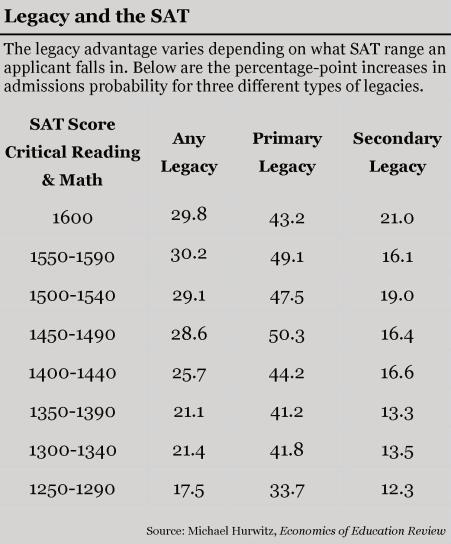CONTACT US
How to Optimize Your Status as a Legacy for College Admissions
Editor’s Note: This article is the second in our four-part series Demographic Factors in College Admissions
It is no secret that legacies, or applicants who already have familial ties to a college, are afforded a significant advantage in college admissions. In fact, according to a study conducted by Harvard professor, Michael Hurwitz, legacies generally experience a 23.3% increase in their probability of admission. Primary legacies, or students whose parents attended the institution as undergraduates, possess an even greater statistical advantage. Through the data that he gathered from 30 highly selective colleges, Hurwitz found that primary legacies get a 45.1% statistical boost; whereas secondary legacies, or applicants with looser affiliations with the school (like a parent who attended its graduate school or a sibling, uncle, or grandparent who attended as an undergraduate), can tack on an additional 13.7% to their chances of being admitted. Read on to learn more about how your student’s legacy status can impact his or her chances of admissions.
Hurwitz’s study was the first of its kind to distinguish primary and secondary legacies and thereby illustrate that primary legacies have a greater statistical advantage than anyone had previously understood. In other words, when admissions officers claim that they are committed to cultivating intergenerational ties to the school, they are not kidding around. In fact, legacy status has the potential to give applicants a greater statistical advantage than being an underrepresented minority or a recruited athlete.

While it helps to be a legacy applicant at a university, it does not guarantee admission. SAT scores have a heavy influence in the equation.
As Hurwitz underscores in his study, SAT scores can play a pivotal role in optimizing a legacy’s chances of admission. As you can see from the chart above, the higher an applicant’s SAT score, the more impactful his or her legacy status becomes. Generally speaking, the SAT gold standard for highly competitive schools hovers between 2100 and 2200 (or 1450 on the combined critical reading and math sections). Legacy applicants within this range experience the most significant boost in their chances of admissions; whereas students with even higher scores start off with higher admission rates, which make their legacy status appear to confer less of an advantage. Regardless, legacy status can take some pressure off an applicant’s GPA—if his or her SAT score meets this criterion.
Since the vast majority of students will not be able to achieve an elite score on the SAT without ample preparation, parents should make an objective assessment of their student’s test-taking abilities and make plans for test preparation far in advance. Savvy parents start thinking about the SAT at the end of their student’s sophomore year. Legacy families should seek out advice even earlier. Experts in college admissions and test preparation can be an invaluable source of information on SAT strategy, and many companies offer diagnostic tests that can determine the effective scope and intensity of test preparation customized for each student. These resources are essential to giving legacy applicants the statistical boost that Hurwitz’s findings indicate.
Unfortunately, Hurwitz’s study is limited to the quantifiable data that he collects. What is ostensibly absent in his study is that the increased odds for legacy applicants are not solely a result of their legacy status; rather, they are a product of successful management of alumni relations. Hurwitz begins to shed light on this phenomenon when he says, “the magnitude of this legacy admissions advantage depends greatly on the nature of the familial ties between the applicant and the outcome college, and, to a lesser extent, the selectivity of the outcome college and the applicant’s academic strength” (Vasavada, Navendu; Ivy Admission Analytics for the Fox Parent). In other words, the effective solidification of familial ties to a particular institution directly determines the efficacy of an applicant’s legacy status.
Because parents are often unaware of the behind-the-scenes work necessary to securing the admissions advantage afforded to legacies, thousands of legacy applicants are still rejected every year by their parents’ alma maters. Additionally, according to Hurwitz’s study, the import placed upon legacy status is institution-specific (and concealed from the public). For these reasons, legacy applicants should not feel complacent about their future prospects; instead, legacy status should be viewed as a foundation upon which parents can build a powerful case for their students’ admission.
So, what behind-the-scenes work is necessary to secure the admissions advantage for legacy applicants? Unfortunately, because strategies for legacy students are so sensitive, valuable, and family-specific, we cannot disclose them on a public forum. For this reason, we highly recommend seeking out the services of a college consultant as they can customize their advice to your family’s situation and provide you with insider’s information that can give your student a competitive advantage—even over other legacy applicants. Keep in mind that not all college consultants are created equal. Generally speaking, those who have experience with private high school students and specialize in admissions to elite colleges will possess superior knowledge about how to leverage legacy status. Cardinal Education, for example, works with a majority of legacy applicants every year from both private and public schools locally, nationally, and abroad. The earlier parents seek guidance on these matters, the better. In today’s competitive environment, having a casual conversation with a college consultant even in the middle school years has become the norm for proactive parents.
Like what you see here? We are happy to permit you to use our material as long as you link back! Please refer to us as the Cardinal Education Blog.
SEE OUR RESULTS
DISCLAIMER
Cardinal Education is an independent educational consulting company. We are not affiliated with or endorsed by any private school, including those mentioned on this website. All school names and trademarks are the property of their respective owners and are used here for descriptive purposes only.

